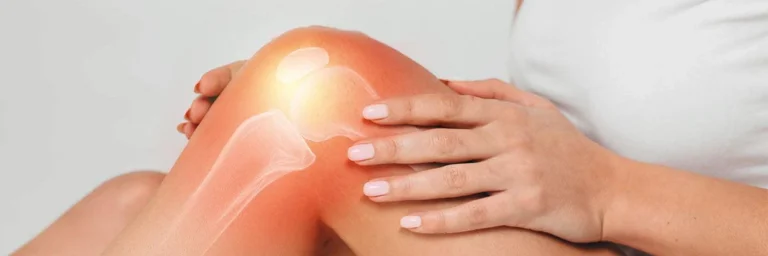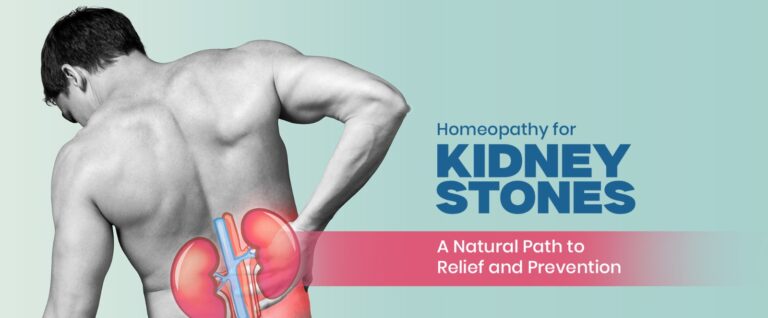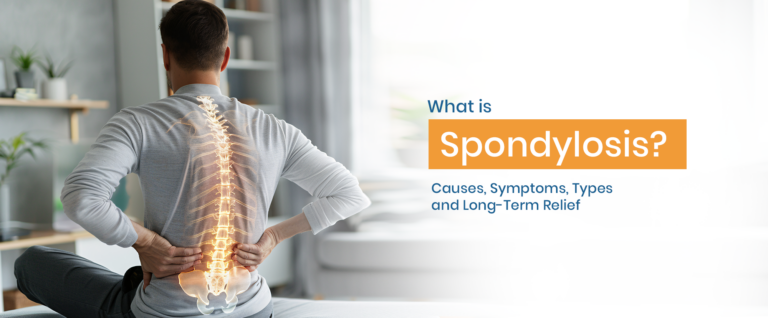One of the most common complaints that most people suffer from is knee pain. While knee pain may often be disregarded as a common problem it can take a toll on everyday activities. Whether it is minor or major, it can affect people of all ages.
There are various causes of knee pain, such as injury, aging, ligament tear, cartilage tear, and more. In a lot of cases, it may usually settle down with rest and self-care. However, in some cases, knee pain can be severe and may require proper medical care. Certain severe instances of knee pain may also call for an emergency surgery.
While knee pain can be managed with self-care like hot compression, OTC pain relieving gels or creams, and basic exercises, it is always important to be careful of the symptoms. If you notice your knee pain worsening or persisting for more than a few days, it is essential to see a healthcare provider and get it properly treated.
In this article, we will be learning in detail about knee pain, its symptoms, causes, treatments, and more. We will also learn about homeopathy for knee pain and its benefits.
What Is Knee Pain?
Before you learn about knee pain, let us first understand the basic anatomy and functioning of the knee joint. Knee pain is the discomfort or pain that a person experiences in and around the knee joint. A knee joint is responsible for connecting the thing and lower leg and is the biggest joint in our body. The knee joint provides support to the upper body weight and helps us move. Hence, it is a joint that takes up a lot of load and gets most commonly injured.
Knee pain can be short-term and temporary or can be long-term due to a chronic health condition. Patients may experience intermittent pain or a continuous one. Some individuals may experience knee pain in the morning after they wake up, while some may experience it when moving or performing any sort of activity.
Knee Pain Fact File
- According to knee pain centers of America in 2024, the prevalence of knee pain was found to range from 10%-60% among different populations, and the prevalence was high among people of older age groups.
- It was observed that the risk of knee pain was higher in people who had obesity.
- About 60% of studies found that the prevalence of knee pain was high in individuals who did heavy physical labor.
Causes Of Knee Pain:
Some of the most common causes of knee pain are:
Arthritis:
There are more than 100 different types of arthritis that can affect the joints and cause its degeneration. Arthritis also causes inflammation in the joints. Some of the common types of arthritis that can affect the knee joint include osteoarthritis, gout, pseudogout, rheumatoid arthritis, septic arthritis, etc.
ACL injury:
ACL injury is a tear that occurs in the anterior cruciate ligament (ACL). This ACL tear can cause significant pain in the knee.
Knee bursitis:
In certain cases, injuries to the knee can cause inflammation in the bursae. The bursae is a small sac found outside the knee joints. This sac acts as a cushion for the joint. Inflammation of the bursae can cause knee pain.
Fractures:
Another common reason for knee pain is a fracture in the knee bone. Knee fractures can occur due to accidents such as falls.
Meniscus tear:
Meniscus is the cartilage present between the shinbone and thighbone. This meniscus can get torn when the knee is suddenly twisted while taking up heavy weight.
Dislocated kneecap:
When the patella present in front of the knee slips out of its place, it can come outside the knee and cause severe knee pain.
Hip pain:
Having hip pain can cause changes in walking patterns and lead to stress on the knee joint. Excessive stress on the knee joint can cause knee pain in the long run.
Overuse of the knee joint:
Playing excessive sports, too much heavy exercising, and physical activity can cause the knee joint to undergo stress. This repeated stress on the knee joint can cause knee pain.
Patellar tendinitis:
This is a condition that causes inflammation of the tendons connecting the kneecap and the shinbone.
Aging:
Aging is another common cause. As we age, the joints become weaker and degenerate with age. As a result, many elderly complain of knee pain and swelling.
Obesity:
Being overweight puts excessive pressure on the knee joints, leading to pain and swelling.
Baker’s cyst:
This presents as a lump filled with fluid forms at the back of the knee. This cyst may cause swelling and pain in the knee.
Lupus:
This is a long-term immune system condition that leads to pain and inflammation of the knee joints.
Symptoms of Knee Pain
The severity and location of knee pain may vary based on the cause of the pain. In general, some symptoms of knee pain include the following,
- Knee stiffness
- Swelling in the knee
- Inability to straighten the knee completely
- Pain when walking
- Weakness in the knees
- Popping or crunching sounds when making any movements
- Redness in the knee area
- Warmth to touch
Diagnosis of Knee Pain
The healthcare provider will perform a physical examination to check for tenderness, swelling, warmth, redness, and pain in the knee. The healthcare provider will also check the leg movements to see the flexibility and integrity of the knee joint. Additionally, the medical history of the patient will be checked to see if there are any signs of any underlying health condition.
For further confirmation, the following tests will be done
Lab Tests:
Blood tests and urine tests will be conducted to check for signs of infection and inflammation.
Imaging Tests:
These tests are performed to look at the structure of the knee and the surrounding tissues. These tests help detect degenerative joint diseases, injuries, fractures, and more. Some of the imaging tests for diagnosing the cause of knee pain include X-rays, ultrasound, computerized tomography (CT) scans, and magnetic resonance imaging (MRI).
Knee Pain Treatments:
When home remedies do not work for knee pain relief and if the imaging tests show any damage to the joints of the knee, then the following treatments may be prescribed.
- Pain relieving medications
- Physical therapy
- Injections
- Surgery (in severe cases)
Homeopathy Treatment For Knee Pain
Comprehensive. Safe. Effective
Homeopathy uses the approach of treating the body as a whole and focuses on the long-term healing of the patient. Homeopathy has treatment for various conditions, including knee pain.
Homeopathy remedies not only help with symptomatic relief but also target the underlying condition, thereby focusing on improving the overall health of the patient. This holistic approach of homeopathy can work not only on the knee pain but also treat conditions like arthritis which are immune system disorders, improving the patient’s quality of life. Some of the homeopathic remedies prescribed by homeopathic practitioners include:
- Bryonia Alba: This is administered to individuals who experience knee pain when they move their knee or while walking. This remedy is also useful for individuals experiencing knee pain due to osteoarthritis.
- Colchicum: This homeopathic treatment is prescribed to individuals who experience worsening knee pain on movement and for patients whose knee pain improves with rest and in warm weather. It is also advised to use a warm compression on the affected after this remedy is taken.
- Rhus Tox: This is prescribed in conditions where knee pain worsens in damp weather conditions. It is also given when the individual experiences intense pain when moving their knee initially, while the pain becomes better with rest.
- Silicea: This is useful in individuals with knee pain that feels like the knee is being tightly bound or constricted. This remedy works by relieving the tightness in the knee joint.
- Lachesis: This remedy is one of the best homeopathic treatments for knee joint pain caused due to rheumatoid arthritis. It is also used in individuals who have knee pain along with abnormal growth around the area affected.
- Ledum Pal: This is particularly effective in treating knee pain occurring due to gout and rheumatism. It also addresses the symptoms that become worse in cold weather.
- Benzoic acid: This treatment is usually prescribed when the knee pain occurs due to uric acid deposition in the joints, causing knee pain and discomfort.
Homeopathic treatments for knee pain are natural, safe, and have very few to no side effects. These homeopathic remedies work by addressing the root cause of the condition rather than just treating the symptoms.
Prevention of Knee Pain:
Prevention of knee pain may not always be possible. However, there are certain measures that can help prevent knee injuries or worsening of knee joint disorders. These preventive measures include the following,
Maintaining a healthy weight:
Being overweight can put extra pressure on the knee joints and strain them. This excessive knee pressure can increase the risk of injuries and joint problems like osteoarthritis.
Maintaining correct posture:
To keep the knee joints healthy, it is essential to learn the right techniques and maintain correct posture while exercising. You can also get help from professional sports teachers or trainers to learn the proper techniques.
Being mindful about the exercises:
If you have a history of severe knee pain, knee injuries, or osteoarthritis, then it is important to learn and practice the right exercises to avoid damaging the knee joint further. Low-impact activities are extremely beneficial in maintaining the health of the knee joint in case of any knee conditions. Indulging in high-impact activities may sometimes worsen knee joint pain. Hence, it is important to take advice from a healthcare provider about the right exercises for knee pain.
Home remedies for Knee pain
- Taking adequate rest and avoiding intense activities for a few days
- Icing the area for 15-20 minutes, for around 3-4 times a day, can help reduce the pain and swelling
- Using warm compression can also help with pain relief
- Using straps, elastic bandages, or sleeves to wrap the knee can also provide support, relieve pain and reduce swelling
- Taking OTC pain relievers or applying pain relieving gels and creams can also help with the pain
- Elevating the knee using a pillow under the heel when lying down or sitting can also reduce the pain
- Practicing gentle stretches and exercises is also beneficial for knee pain
*Disclaimer: The information provided about home remedies for knee pain is for educational purposes only and is not intended as a substitute for professional medical advice, diagnosis, or treatment.
The Dr. Care Approach
Homeopathy at its best
At Dr. Care, a team of over 300+ homeopathic doctors are committed to find solutions and relief for patients with varied diseases and conditions.
Dr. Care’s specialists in knee pain approach the patient’s condition holistically with the objective of completely healing patients in the long run. Our homeopathy treatments are process-driven, involving careful assessment of the patient’s general health condition and addressing pain points and gaps so that the treatment is effective.
What makes Dr. Care’s approach is unique and result-oriented in addressing the underlying issues and the root causes of the disease or condition.
If knee pain is interrupting your daily life and you are looking for a complete solution, reach out to us at <doctor@drcarehomeopathy.com>. The Dr. Care Team will guide you through a personalized process and program, helping you lead a pain-free and normal life.



